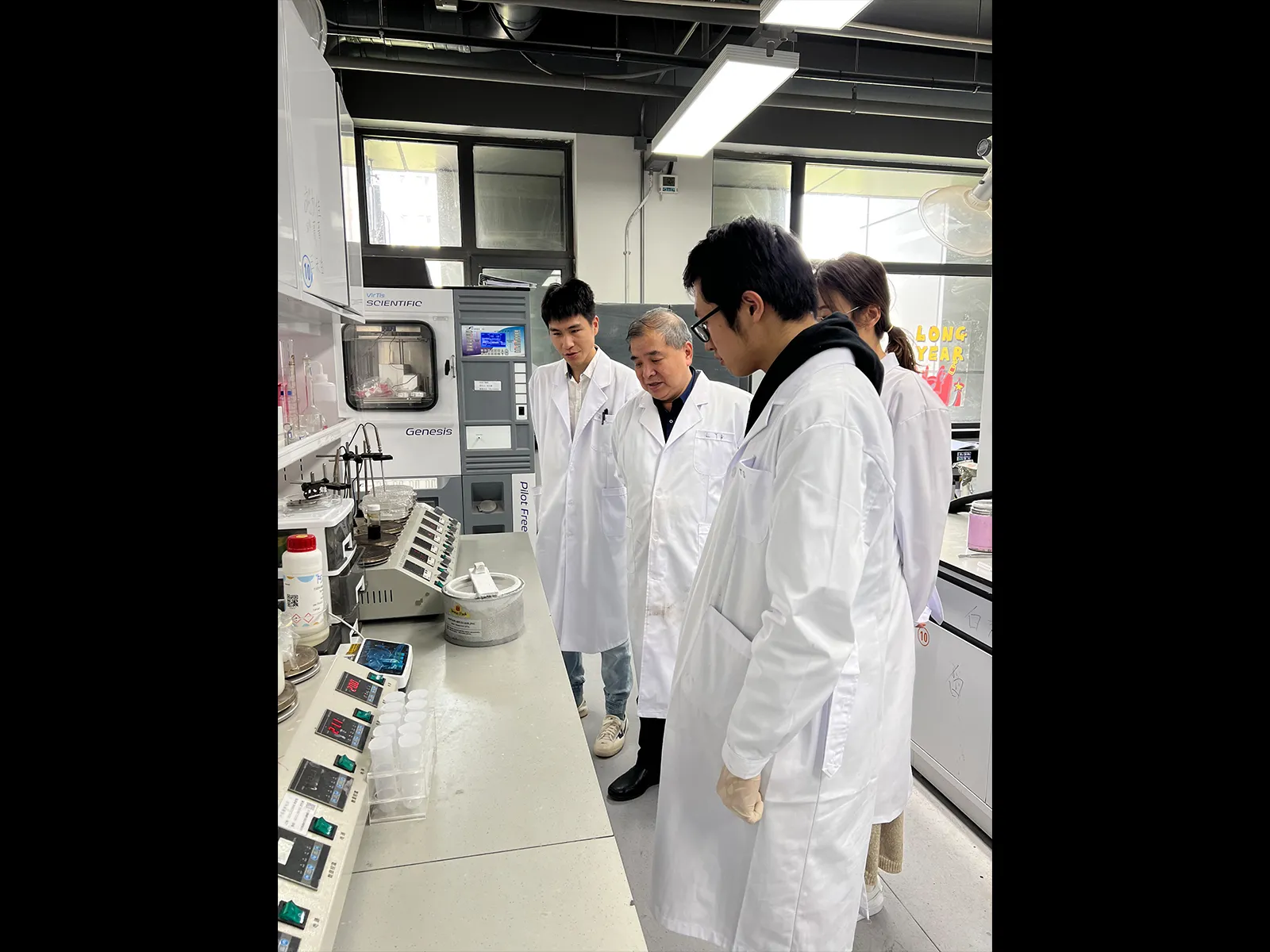Winner: 2024 Dalton Horizon Prize
Inorganic Amorphous Nanomaterials
Beihang University
For innovative methods for controllable synthesis of materials combining high strength and high toughness.

2024 Dalton Horizon Prize winner: Inorganic Amorphous Nanomaterials
The team has developed a range of engineering materials by assembling amorphous/crystalline micro/nano particles in a specific way. These materials are strong and tough (qualities typically seen as opposites), like multiscale engineered artificial tooth enamel, bulk graphene oxide composites, and multi-stage nanotwinned diamond composites. These composites have promising applications in tooth repair, aerospace, deep earth exploration, and more.
Lin Guo: "For the multiscale engineered artificial tooth enamel, we have already confirmed the effectiveness of the material treatments and will soon move towards commercialization to benefit the patients in need."
Inorganic Amorphous Nanomaterials
The team
Cezhou Chao, PhD student, Beihang University
Ke Chen, Associate Professor, Beihang University
Xuliang Deng, Professor, Peking University School and Hospital of Stomatology
Leiting Dong, Professor, Beihang University
Mingrui Gao, PhD student, Beihang University
Yufei Gao, Experimentalist, Yanshan University
Binghui Ge, Professor, Anhui University
Keisuke Goda, Professor, The University of Tokyo
Lin Guo, Professor, Beihang University
Junyu Hou, PhD student, Beihang University
Wentao Hu, Senior Experimentalist, Yanshan University
Binbin Jia, Postdoctoral Research Fellow, Beihang University
Lei Jiang, Professor, Beihang University
Nicholas A. Kotov, Professor, University of Michigan
Yangbei Li, PhD student, Beihang University
Zihe Li, Postdoctoral Research Fellow Yanshan University
Shaojia Liu, Postdoctoral Research Fellow, Beihang University
Xiaoxiao Liu, PhD student, Yanshan University
Xuke Tang, PhD student, The University of Tokyo
Yongjun Tian, Professor, Yanshan University
Jing Wang, Master student, Beihang University
Yanbin Wang, Professor, University of Chicago
Zhongchang Wang, Professor, International Iberian Nanotechnology Laboratory
Bin Wei, Postdoctoral Research Fellow, International Iberian Nanotechnology Laboratory
Yan Wei, Professor, Peking University School and Hospital of Stomatology
TingHui Xiao, Assistant Professor, The University of Tokyo
Bo Xu, Professor, Yanshan University
Zhenyu Yang, Associate Professor, Beihang University
Pan Ying, Postdoctoral Research Fellow, Yanshan University
Dongli Yu, Professor, Yanshan University
Yonghai Yue, Professor, Beihang University
Xiaolong Zeng, PhD student, Beihang University
Qi Zhang, Master student, Beihang University
Xuejiao Zhang, Master student, Beihang University
Hewei Zhao, Professor, Beihang University
XiangFeng Zhou, Research Fellow, Yanshan University
Q&A with Inorganic Amorphous Nanomaterials
Lin Guo: By having different people specialize in specific tasks, we can boost productivity, refine techniques, and deliver higher-quality results. Moreover, this specialization fosters innovation, enhancing our ability to brainstorm and generate creative ideas.
Yonghai Yue: The most important creativity of a team is to be able to bring together outstanding talents with different personal characteristics and give full play to each person's strengths, so as to make some top scientific research results, and it is also the source of strength for our team to grow day by day. It's like a fast-running machine, different parts play different roles, but they are all designed to keep the machine running efficiently.
Lin Guo: To solve the trade-offs between high strength and high toughness and provide better solutions for the synthesis and assembly of amorphous nanomaterials.
Yonghai Yue: After several years of hard work, we have successfully prepared new materials with excellent mechanical properties, such as artificial tooth enamel, which will provide a better choice for patients with tooth loss and damage in the future, such as ultra-hard and high-toughness diamond materials, which will play an important role in the field of high-pressure science, and the discovered room-temperature self-healing behaviour provides new ideas for the development of long-life super-hard and brittle materials
Yonghai Yue: How to improve the comprehensive performance of materials through structural design has always been a hot scientific issue that people focus on, and it is also the key to designing and developing new materials and expanding the application fields of materials. We have designed and successfully prepared several new types of structural materials, optimized and enhanced the interface interaction, and solved the scientific problem that materials cannot simultaneously have superhard, high strength, and high toughness. This is of great significance for the design of high-performance new materials.
Lin Guo: For the multiscale engineered artificial tooth enamel, we have already confirmed the effectiveness of the material treatments and will soon move towards commercialisation to benefit the patients in need.
Hewei Zhao: In the future, artificial tooth enamel will be available in larger quantities and at a more affordable price, ensuring accessibility for more applications.
Lin Guo: My curiosity drives me to solve the challenging issue of balancing the strength and toughness of materials.
Ke Chen: Fight for your dreams, create your vision!
Yonghai Yue: I think it is the scientific interest in exploring the laws of the nature of matter.
Lin Guo: Collaboration exposes our team to fresh perspectives. Those deeply entrenched in a project may overlook innovative solutions, whereas newcomers may offer unique insights. Additionally, collaboration enhances productivity and fosters deeper interpersonal connections within the team.
Yonghai YueWith the increasing complexity of the scientific problems explored and the structural design and performance control of high-performance materials, it is becoming more and more impossible to answer a question alone; it requires the collaboration of researchers with different scientific backgrounds. In many cases, chemical science involves not only pure chemistry problems, but also multidisciplinary problems, which require the joint efforts of researchers with different professional backgrounds to understand the essence of the problem, so cooperation is very important not only for chemical science, but also for other sciences
Lin Guo: A good research culture helps us feel self-valued and share good experiences even when mistakes are made.
Lin Guo: To create better matters and help the world use both renewable and non-renewable resources to transform our lives, ranging from protecting daily life to developing functional aerospace materials with stable performance.
Our winners
We are recognising individuals, collaborations and teams for their exceptional achievements in advancing the chemical sciences. Explore our prize winners, and discover and share their stories
Thank you to everybody who took the time to make a nomination this year, and to all of our volunteers on our judging panels.
